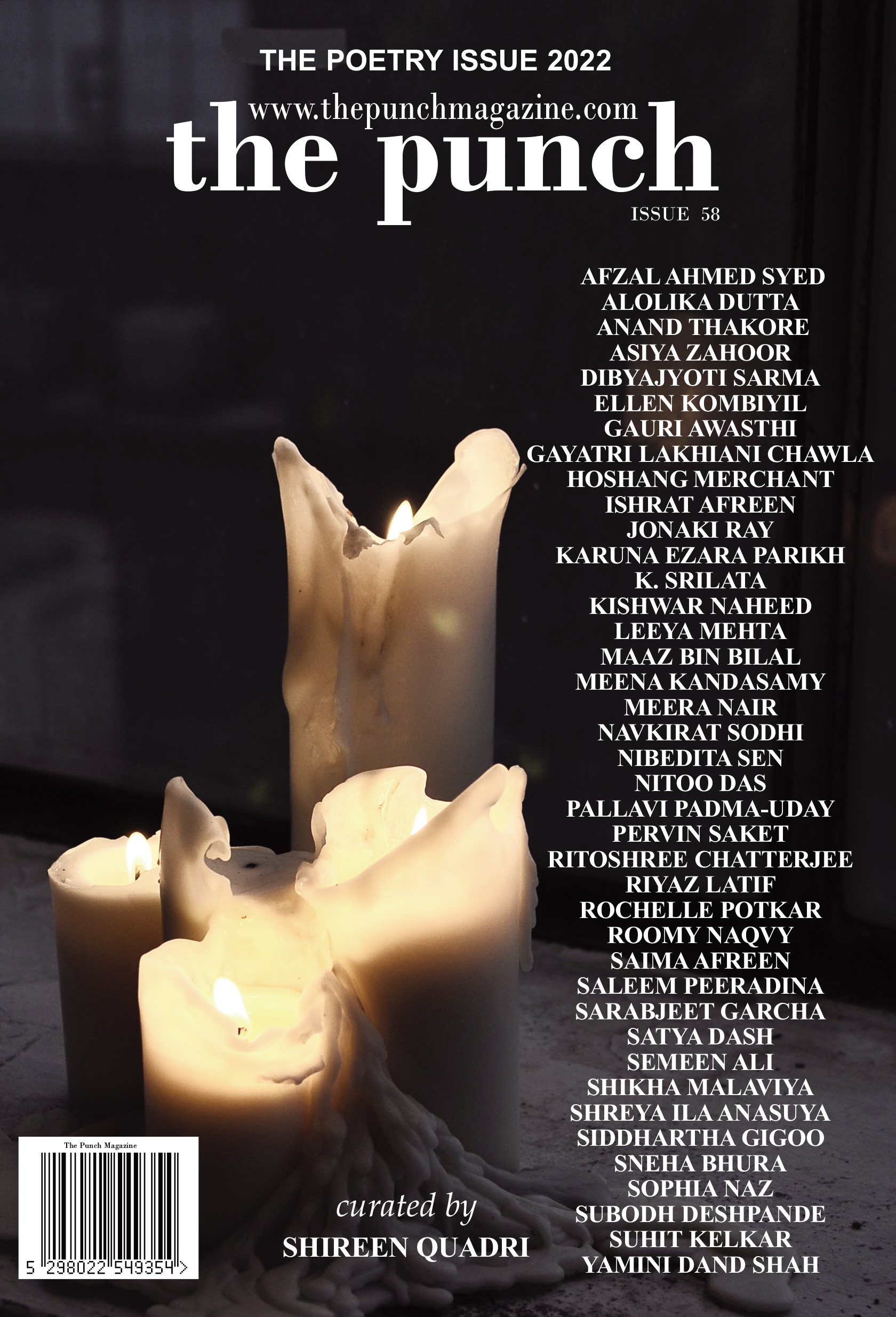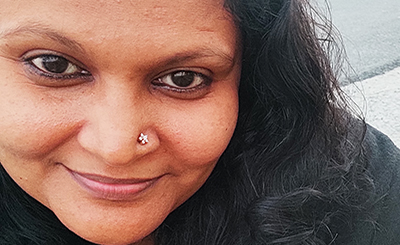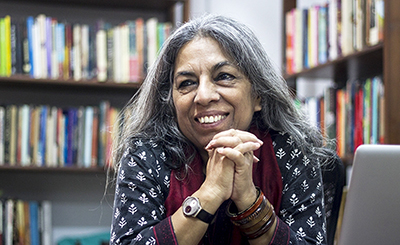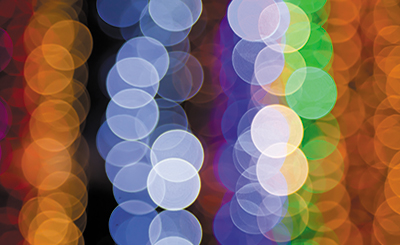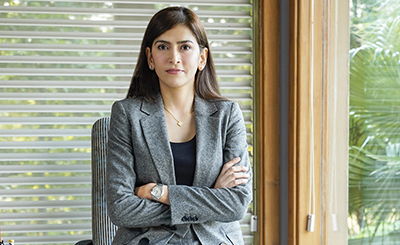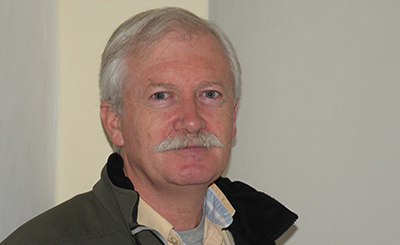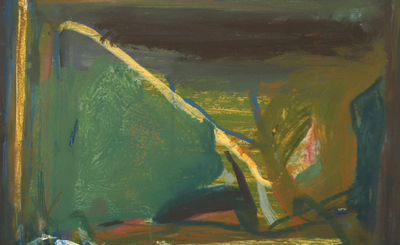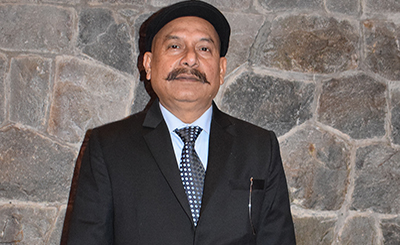Poems by 40 poets from the Indian subcontinent/diaspora, prefaced by notes and essays on their poetics, curated by Shireen Quadri
Afzal Ahmed Syed: “I had an affinity with poetry from childhood but started to write poetry late in life, at the age of 30. My genre of choice is prose poetry, but occasionally I write ghazals as well. There were a few Urdu poets writing prose poetry when I started writing in this genre. The recurring themes in my poems are psychic violence and political oppression. I am a bit of a storyteller. I write about everyday events and persons, fictitious or real. Rather than metaphors and similes, I emphasize surreal imagery. I love writing poetic parables.”
Alolika Dutta: “I approach poetry with a sense of devotion. There are rituals I like to adhere to. When I am working on a poem, my day opens with it and closes with it. I tend to think about it all the time, though I have other commitments too, not least accounting. I used to wonder if artists are all obsessive about their arts, but I have found that I am not that way when I am painting. Painting, to me, is not as compulsive a desire as poetry. When I paint, I can set the paper aside, but it is not so when I am writing, at least not with as much ease and forbearance.”
Anand Thakore: “Whatever else poetry may be about, it remains importantly, for me, an attempt to make music out of life and language; an attempt to imbue language and life with the brief benedictions of a higher musical order. When I say ‘music’, I do not mean merely the various structures in sound and time that music comprises of, though these too, have always been terribly important to me as a poet. My obsession with those structures underlies my early experiments with forms like the sonnet and the villanelle or with poems arranged in rhymed quatrains or tercets and poems that revolve around chorus-lines; but my view of these structures has also changed with time.”
Asiya Zahoor: “My poetry often reimagines the lives of women and revisits South Asian as well as European myths from the perspectives of women characters. History of the subcontinent in general and Kashmir, in particular, runs all through my poems. They try to demonstrate how life can simultaneously hold survival, revolution, and unquenchable love. Dreams, obsessions, and passions are at the core of all poems. The narratives of the poems are the privilege often given to women or trees and rarely even to inanimate objects such as a closed and a half-open file on a table talking to each other.”
Dibyajyoti Sarma: “I have read widely and discovered many poets that I admire (Elizabeth Bishop, Seamus Heaney, Geoffrey Hill), but Eliot remains the guiding light in my quest for poetry. If you ask me, the reason is simple. The Assamese poets that I read, those who inspired me to write poetry, they themselves in turn were influenced by Eliot and other modern poets. So, I discovered modernism twice and I could never shake its influence. Unlike other poets with a bilingual background, somehow, I am not interested in the function of language in poetry. I am old school. For me, poetry must tell a story. It must stir emotions. It must transcend personal for universal.”
Ellen Kombiyil: “My practice as a poet is continually evolving. I feel most alive when I’m writing or creating in some way. It’s also easy to fall into a rut or staleness or let anxiety overwhelm me so that the blank page is scary. The way to deal with all of these pitfalls is to find a new way in, a new way of seeing, a new way of being with language. Usually, it involves playfulness. Those are the best days.”
Gauri Awasthi: “I like to think of my practice as worship. My writing has remained personal, but as my understanding of my privilege has become layered, my craft and voice have deepened to reach a space of looking inwards. Reflecting on the malleability of art forms and the intersection of ideas has, in turn, led me to pay attention to musicality in my work. I often return to my training as a Bharatanatyam dancer – my foremost education in encapsulating emotions – a skill that I continue to develop through poetry.”
Gayatri Lakhiani Chawla: ‘I love the mystery of a poem, I’m never certain of how the poem is going to end — I let the poem take its own journey. Some of my poems are peppered with images of dreams from the subconscious and unconscious mind- Poems have their own temperament I give them freedom to say what they want to. There’s nothing more gratifying than crafting a poem. I experience with forms like haibun, haiku, prose and found poetry because the newness of form intrigues me.”
Hoshang Merchant: “My hero is Anais Nin and by extension Kamala Das and Namita Gokhale. I detest the male swagger of the Bombay School and their women poets imitating the style of Nissim Ezekiel. Ezra Pound’s Cantos, which I imitate in my Paradise Isn’t Artificial (Red River, 2021) opened out the form to me as for countless others. I wrote ghazals before Agha Shahid Ali whom I admire as I do Suniti Namjoshi, a pioneer fabulist of lesbian experience.”
Ishrat Afreen (Translator’s Note by Raza Naeem): “One of my favourites among Ishrat Afreen’s poems is Intesaab (Dedication) for its ‘take-no-prisoners’ attitude and its direct evocativeness. Another poem Gulaab Aur Kapaas (Roses and Cotton) positions her more in the tradition of the progressive writers, especially Makhdoom, who sought to see beauty in labour and valued women’s labour through traditional invocations of beauty. Afreen takes the metaphors much further, though, positioning them directly against the ephemeral concept of beauty associated with privilege.”
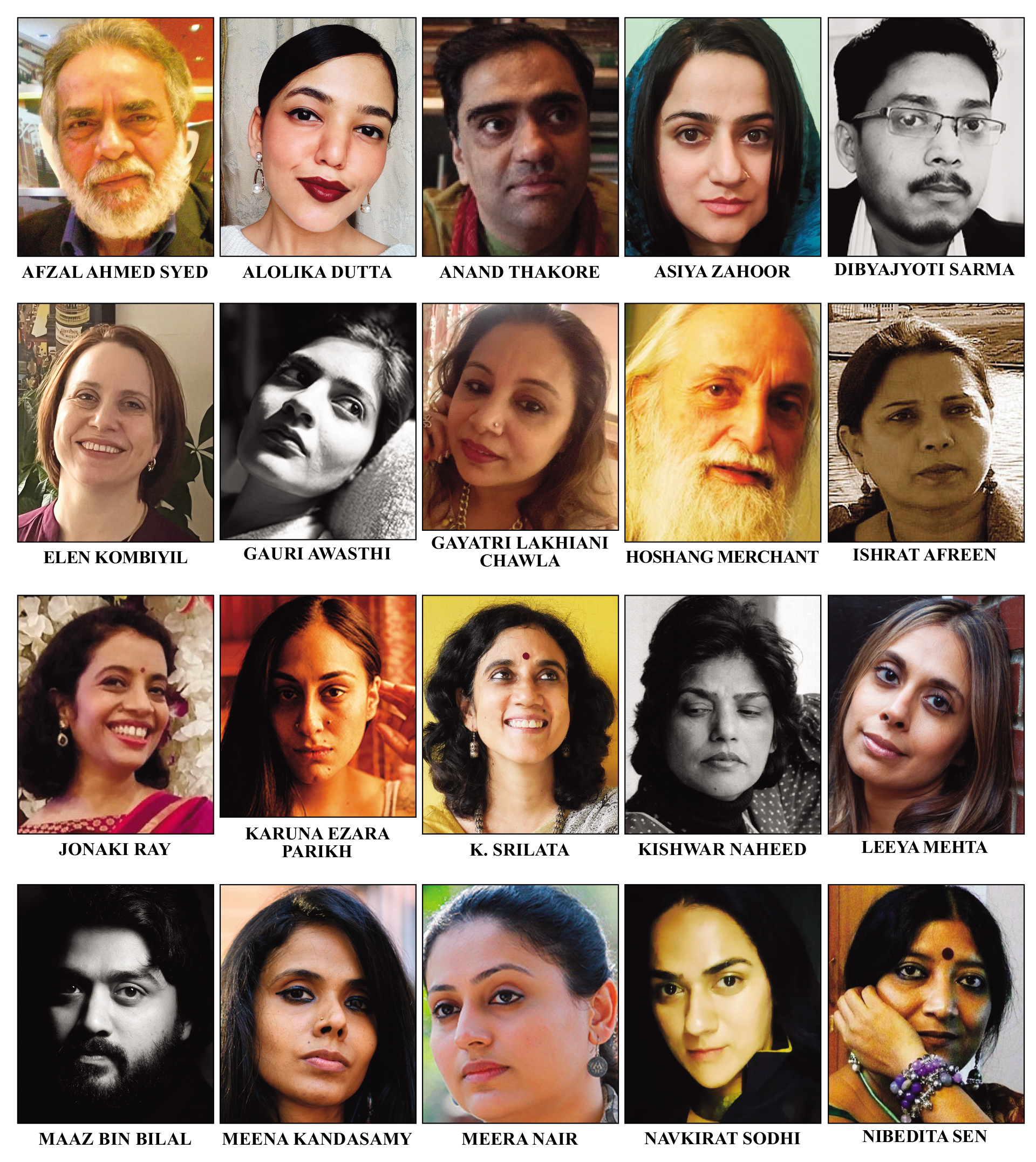
Jonaki Ray: “I don’t usually follow traditional forms or structures in my writing, especially poetry. But, I do enjoy and write poetry that has an innate rhythm interweaved into it. I write on the themes of migration and power imbalances, both in the natural and man-made world. I’m also fascinated by the cyclical nature of history and the impact of time on our memories and histories. Staying home during the pandemic has made me restart my music practice — I learnt classical Hindustani vocal music as a child, and incorporate the concepts of music into my poetry as well.”
Karuna Ezara Parikh: “The actual act of creation is done in silence and wonder. In complete surrender, in fact. In those moments there is only rawness and healing, a blizzard of feelings. There is light and nature, extraordinary and bountiful suddenly the world emerges as a constellation with all parts connected via death, via joy, via stories. And through the poet, the planet and all that is secret and known about it, emerges. And maybe that, there, is my final understanding of my work and my presence as a poet — to be a medium. To bear witness and to tell the endless record of what makes for stirring and what for stillness.”
K. Srilata: “Though I have experimented with a range of forms, free verse remains my preferred form. Part of this, I suspect, is because free verse lends itself readily to storytelling, wrapping its contours over where ever the human story takes one. Lines breaks in free verse are intuited and follow the breath. Oftentimes, they appear quixotic, their logic not immediately apparent. I enjoy the go-with-the-flow nature of free verse and what it enables.”
Kishwar Naheed: (Translator’s Note by Raza Naeem) “Kishwar Naheed is identified as a distinct voice in modern Urdu poetry. Her tone is individualistic but it has the echo of the widest collective experience: ‘Meri aavaaz, mere shahr ki aavaaz hai/Meri aavaaz, meri nasl ki aavaaz hai. Her work not only reflects her own personal journey as a poet and feminist, but also acts as more than her autobiography — it is the voice of a whole generation which came of age in the 1960s (both during the dictatorship of Ayub Khan in Pakistan and broader currents of resistance across the Third World). In her poetry, Naheed has universalized her Pakistani identity by striving to gather together the sorrows and travails of all the women of the Third World.
Leeya Mehta: “I love the narrative poem. The poems that particularly interest me as a reader and writer have possibly three attributes. The first is details and characters, like in the title poem of Louise Glück’s National Book Award-winning collection Faithful and Virtuous Night and many of Robert Frost’s narrative poems. The second is historical context, where a line in the poem places us within the guardrails of history, like in ‘September 11939’ by WH Auden or ‘Telemachus’ by Ocean Vuong. The third is the lyric poem, expressing the writer's emotions. The elegiac form of the lyric brings both insight and empathy to writer and reader like in Dom Moraes’s ‘A day in Ayodhya’.”
Maaz Bin Bilal: “Growing up between the words of English and the music of Urdu, it was upon reading Agha Shahid Ali that I discovered the possibilities available to me in the English ghazal. Since then, the English ghazal has been both my creative release, and, as I have lately felt, my pet peeve, against which I increasingly seek to rebel. Also, having dividing my time for the last half a dozen years between Delhi and its northern suburb, I have grown enamoured of birds, and bird imagery and mythology are beginning to find their way into my poems. I would like to let my selection of poems here say the rest.”
Meena Kandasamy: “My journey as a poet was fairly run of the mill. I was shy and writing secretly —partly to process what I couldn’t write in my day-job as the editor of a small alternative magazine that folded up in six months, and, later as translator. Those who read my work were full of praise, and the one person who I will always single out for giving me confidence in my own work was S Anand, who now runs Navayana.... I returned to poetry after many years — partly as a response to what was happening politically around us, and personally, to capture the inner-world and feelings of being a mother of young children.”
Meera Nair: “I write when I am moved/disturbed. Poetry is no doubt a cathartic process and from darkness comes light! Post turning 30, I wrote a whole bunch of love poems! They kept coming to me like the raging storm. That was also when I compiled my first book of poems. My poems are almost always first drafts. I like them raw. I am aware they may become finer poems if edited. But I believe they will also become something else if tampered with. So I let them be. I am nearing 40 and have calmed down. But yes it continues to rain in my world.”
Navkirat Sodhi: “I am enamoured by the idea of inhabiting multiple planes at any given moment, an idea I explored in my collection If and I. There, I swim through the notion of the plurality of an instance. The poems question, ride and revel in the mystery of being present in different places at the same time — physically, subtly, really. This spiritual bent takes a more concrete form in my translation of the poetry of Guru Nanak (considered the founder of Sikhism) from Gurmukhi to English, verse to verse.”
Nibedita Sen: “Primarily, an artist I work with colours. Yet I paint rarely, and write even less …and whenever I do so, in both cases, I go into a spell…as if possessed by some creative inertia … Most of the time I am fine without even having the least urge to paint or write unless when I am forced to, when I feel solid silences creeping in and lying low between words and sentences… and there is no other way I know of, that could express and explain the meanings of all these… Painting and writing are a kind of ‘monologue’ … I break silences, I talk to myself…”
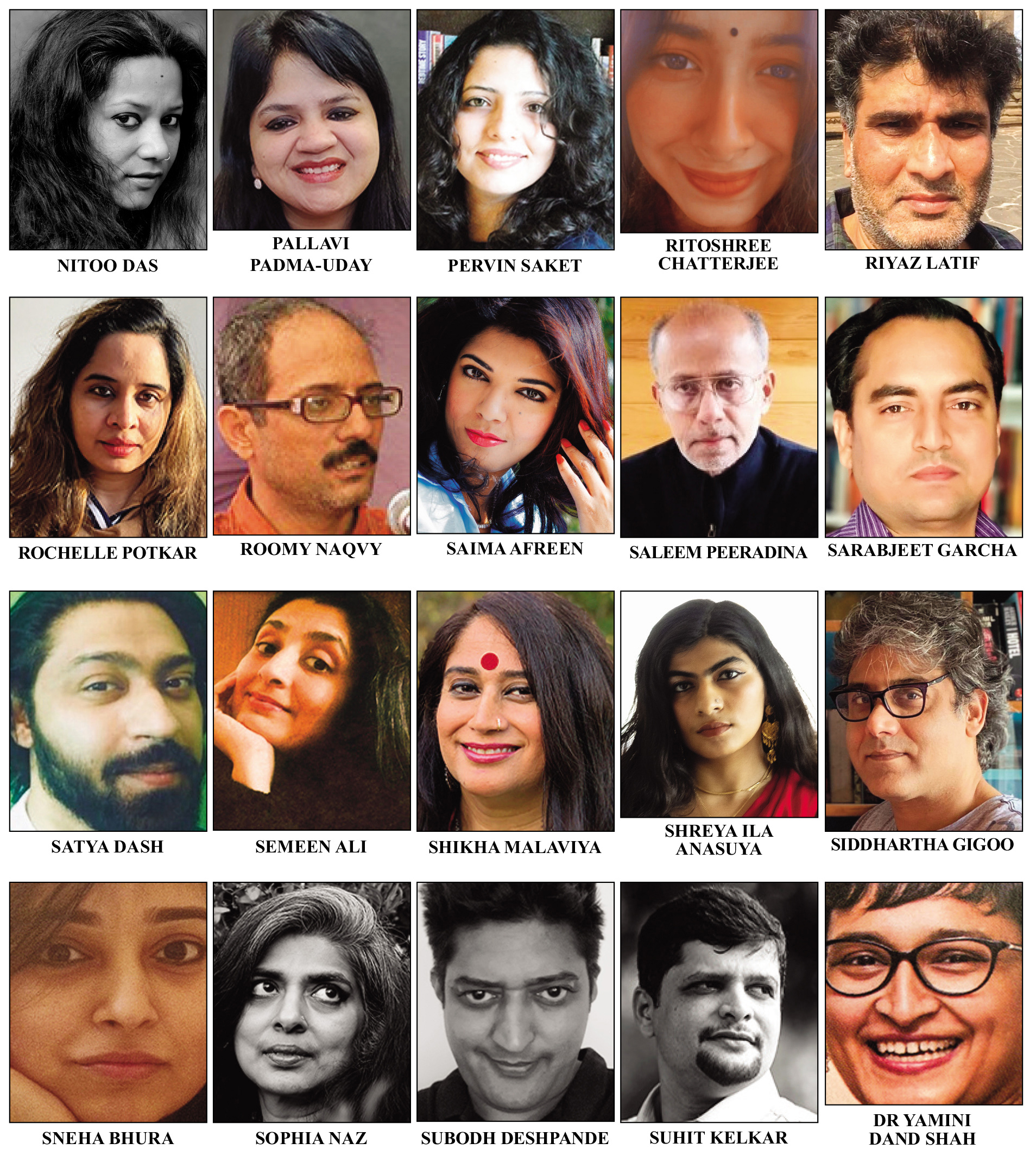
Nitoo Das: “I have always found it a struggle to yoke together the diverse worlds of bird photography and poetry. In the last decade, my study of bird species, taxonomy, habitat, etc. has led to a strange obsession with naming, with knowing. Because my poetry deals primarily with distancing and uncertainty — un-knowing, if you will — this dependence on meticulous accuracy had to be addressed/negotiated. In the past couple of years, my enquiries have also moved inward. I am looking at questions of mobility, slowing down, distancing and detachment, and meaning as approximation in new ways.”
Pallavi Padma-Uday: “Poetry, I realise, is a compulsion for me with everlasting echoes, and I try to make sense of this through everything great poems have taught me – compassion, gratitude, courage, protest, love, humility, kindness. Poems are communities, where one can find solace, or find reasons to fight. Either way, we seek communities because that lies at the core of us as human beings. When we write poems, we expand this community and offer it the cries of a newborn. We continue the tradition, we challenge the old guard, we offer a fresh mould for very ancient problems, and we find new troubles to mess with. That’s poetry for me.”
Pervin Saket: “My poems are moments of walking off the roof. I want to examine the spaces where the ground under our feet — social, geographical, political, linguistic — opens up. The moment of recognising we’re walking on air. In some ways, the poems are in conversation with the very things that made them: ancestors, history, gods and language. But it took a while to get there. I was initially distracted by the noisier versions of these poems.Through various drafts, I found that my work does not want to fit into complex identities but, more difficultly, to transcend them. To transcend not just labels and histories but even the subtler trappings of language and time.”
Ritoshree Chatterjee: “My poems delineate, and subsequently seek to deglorify, the truncated domains and identities (rural, Hindu) women inhabit throughout their lifetimes. They remain replete with terms and idioms endemic to India, from where I write.”
Riyaz Latif: “For me, there is an imperative to transgress the recognizable; to make insistent forays into the emotive landscape of the inarticulate; to engrave on the tablet of being the experiential field which veils itself from communication within the customary semantic folds of expression. It is an unborn world, this palpitating world of the inarticulate, but a compelling one which yearns to be touched in order that we may inadvertently expand and enrich the meanings of our articulate world to weave in more seamlessly its profound ecstasies, its most inhuman horrors, its unedifying banalities, and its limpid enigmas. This landscape of the inarticulate – more appositely, this space which continually emits an interface between the articulate and the inarticulate – is not a realm which resounds with the death of meaning.”
Rochelle Potkar: “I write in free verse for its freedom and free reign. I tried the ghazal, sonnet and villanelle but they came off assembled as prefabricated buildings. I love rhythm and have been told I write lyrically - of all places in Scotland - and was asked if I write songs. I am sometimes confessional and sometimes use the refracted tangent of subterfuge behind my poetic themes. I can’t understand the theory of poetry from literature studies. I just blank out when I hear it. I don’t know how far or close, under the poem or above it I stand, or beyond its planes, but I just write because it comes naturally.”
Roomy Naqvy: “I tend to be extremely self-critical as a person and in my poetic practice. I don’t always necessarily feel all the poems that I have published meet my critique. But poems are like babies, some look picture-perfect, some are a little deformed. All are mine. I don’t even tend to call myself a ‘poet’. I just think my touch upon the writing of a poem should be as hesitant as a child’s. So, while I write, I write with a surety, a conviction, and a squeezing out of my personality into a poem. But when a poem emerges, my touch upon it remains hesitant. I like to dwell in such incertitude. I think this incertitude underlines the process of living itself.”
Saima Afreen: “I don’t write using strict schemes / patterns. I don’t endorse western canonization and mix different styles that automatically create the frame of the poem. I allow the poem to glide by itself using one image or a cluster of a few. Many times, I write the draft and let in rest in my notebook as with time it gets filtered and you see it with a clearer eye discarding what no longer feels part of the poem. A lot happens to your writing when you are actually not writing. The perceptions, impressions, images silently go through distillation getting changed in the process. They are no longer raw, malleable. They take their own shapes ready to merge in words opening their seams bit by bit.”
Saleem Peeradina: (Note by Samreen Sajeda): “Saleem Peeradina’s poems affirm that imagination has the power to accommodate the universe on a sheet of paper. Not only is he able to capture still images but he also excels at freezing transient moments like ‘a silent smile in the very next instant, dissolving, fading . . .’ Likewise he manages to capture the urgency of encountering the beloved in a dream, aware that ‘If I missed you/by a heartbeat, I missed you by a century.’ At the same time, the poet is not unaware of the illusion of the ‘written’ word. He knows that the contractor cannot be trusted to adhere to ‘the agreement in a timely fashion/whether it is verbal or written down.’”
Sarabjeet Garcha: “Poetry happens. All I do is put my interventions in it on paper. It’s as if you are reclining in a boat floating in a river, so you lose sight of the water just because you are surrounded by it. But suddenly, on an impulse, you let go of the oar, lean a bit on the side of the vessel, dip your hands in the water and scoop some of it. You might have been looking to capture the waves glimmering in the sunshine, but what ends up in the cup of your palm is just liquid matter. Now it is up to you to either lose heart or gird yourself up in order to fill up this measly matter with an incantation that replicates, even if only partly, the life it was throbbing with just a few moments ago.”
Satya Dash: “When, why and how do we feel bewildered? What are the forces that conspire wonder? The idea of strangeness and its perpetuating essence in our lives is something that kick started my writing journey few years back and continues to be a cornerstone for any earnest endeavors in my poetry. On a bus ride in Bangalore after years, I hear someone seated behind me remarking with a sigh, what a lazy laptop, it gets stuck all the time. For a moment it is hilarious (like what!), and then turns fascinating immediately when I recollect that phrase in solitude. A lazy laptop—personification in casual speech, in broad daylight, on public transport, out of nowhere! Of course all our laptops and phones turn whimsical after wear and tear through the course of their electronic lives, so why shouldn’t they feel lazy once in a while? And this is where strange images jolt us into life.”
Semeen Ali: “I began writing poetry as a way to examine my feelings about several things around me. I suppose it was a very personal thing for me, more than maintaining a diary. It gave me access to hide behind not just lines and words, which I could twist and turn to camouflage myself, but to also discover a part of me that did not want to be found. And I still try to do that when I write poetry. ... For me poetry is a room where I find myself defining/recreating the self. The idea behind writing poetry is never to try to contain or rather, try to reduce my feelings, ideas, and perceptions to just a few lines. It is to discover in/through those lines many unsaid things.”
Shikha Malaviya: “I’ve always believed in poetry as a form of activism, where the role of the poet goes beyond the realm of personal experience, where the poet is a documenter and interlocutor of the times. As poet and activist Audre Lorde says, “poetry is not a luxury. It is a vital necessity of our existence.” In the same spirit as poets and activists Adrienne Rich, June Jordan, and Audre Lorde, I feel that the act of women writing poetry is a radical one. I also believe that poetry — especially in the context of gender, race and cultural identity — is one of witness, documenting what is said in the margins, or what might be hidden, waiting to be unearthed. Such poetry often acts as a catalyst for raising awareness and becomes a bridge between the present and past. This is probably why I found myself so drawn to historical persona poetry, where stories of the past are explored poetically in the voice of historical figures.”
Shreya Ila Anasuya: “I write across forms and genres, and in the last few years of my practice, mostly out of professional necessity, I have written far more prose than I have poetry. But in many ways poetry is my first love, and the form that I certainly find the most difficult. Even after years of trying to write poetry and studying the techniques and practices poets employ to make their verses robust, I still find something of the magical in the workings of the powerful poem. It is difficult to make a good poem because a good poem contains an essential paradox – it works with the precision of a needlepoint and the expansiveness of the sea. My favourite poems do something fresh with language and imagery, or with humour and tenderness.”
Siddhartha Gigoo: “Writing fills me with vacuum, doubt, haze, and fear. Should writing do that? I don’t know. But it does. Yet, the act of writing creates an illusion of bringing something—a person or a place or the relationship between the two, for instance—into existence, no matter how flawed or ephemeral it might be. It lures you into an unknown world full of puzzles, riddles and mysteries. It gives you a fleeting feeling of experiencing life with its contradictions and paradoxes, its ugliness and beauty. You mistake the finite for the infinite, transitory for the permanent. You see things no one else sees. And then, you marvel at them until they crumble one after another. You see the rise and fall of hope. One more poem, one more sentence, one more word… It’s an endless quest for something that may or may not exist after all.”
Sneha Bhura: “I found poetry in a pandemic. Or rather it found me with a vengeance. It is now a truism to state that poetry became a lifestyle habit in our Covid-stilted times. In the last two years, like countless others, I too have learnt to appreciate the sheer sheltering silence that poetry offers. And it happened in the most propitious way. When Delhi imposed its first ever lockdown on 23 March 2020, I was already flush with anticipation and longing after having met a charming someone just two days earlier — on 21 March. Images from this "date" tenaciously imprinted themselves on my mind and relief would arrive only when I bashed them out in staccato sentences which eventually took the shape of a poem.”
Sophia Naz: “To me the essence of poetry is movement, the movement of words across a line, the movement of lines across a page, the movement of a poem from the poet to a reader. Along the way there are multiple translations, the act of writing is a translation, putting what one thinks on the page, the act of reading another translation, and time is perhaps the ultimate translator of the poem. It is perhaps because I relate poetry to movement that I primarily conceive my poems while walking. I might say lines in my head, or out loud if no one is near, or record them on my phone. I consider the unique breath-signature of a poem as its “bone,” the scaffolding upon which its length and breadth rests.”
Subodh Deshpande:
“I write poetry to let the breathless thoughts jostling in my head,
find a resting place.
My poetry is everything inside me.
The debris I carry from Bombay, Baroda, Poona, Assam.
I am built of these geographies and ONGC colonies I lived in.
Am a child of the Nehruvian public sector.
It all starts with a feeling, that comes out of nowhere.
A line at the back of a bus, some flashy handbag in a queue, some kid yelling at the mall, and I start time travelling. I always walk around a bit dazed as images starts spinning in my head. Stoned immaculate, as Morrison said.”
Suhit Kelkar: As a poet, my concern is to create beauty for a general audience. Recent times have made me flexible and experimental with form and ‘telling it slant’, but I embrace traditional forms like the ghazal or haiku as lovingly as I do more contemporary ways of writing poems. And while I honour such poetic concerns as tweaking, experimenting with, exploding, or exploring language, right now I am writing to communicate with a reader, to transmit and commune with the reader around a ‘point’. My themes are general or universal, and can be entertaining or traditional fodder for poetry, yes, but not necessarily so, they can be intense and esoteric and new. No theme might be more universal than ‘I love you’ and ‘Fire! Save yourselves!’”
Dr Yamini Dand Shah: “Abstract Oralism is a result of seven years of research both oral and epistemological. There is a blurred line between poetry, prose, journalism, myth and public opinions resulting in enjambed and non-metrical lines to arouse a sense of thirst signifying the land it represents. The lyrical element is the protagonist  that weaves in and out of verses sewing them abstractly. Every section is a topographical variation which begins with a flash fiction that initiates the reader with Kachchhi words dialogically while inverting the politics of italics.This research poetry collection is an attempt towards devolved Aristotelian poetics.”
that weaves in and out of verses sewing them abstractly. Every section is a topographical variation which begins with a flash fiction that initiates the reader with Kachchhi words dialogically while inverting the politics of italics.This research poetry collection is an attempt towards devolved Aristotelian poetics.”
The Poetry Special Issue (January 2022), curated by Shireen Quadri. © The Punch Magazine. No part of this essay or the poems exclusively featured here should be reproduced anywhere without the prior permission of The Punch Magazine.
